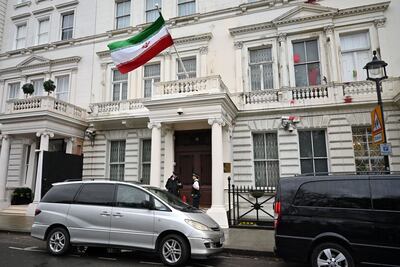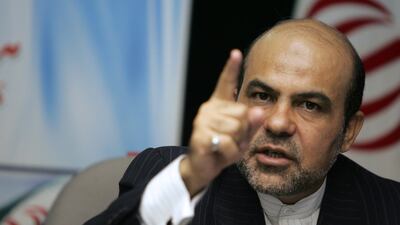Iran appears to have launched a game of nerves with the UK that could have unpredictable consequences.
Alicia Kearns, a leading backbencher in the UK’s Conservative party, has called on the government to recall the ambassador Simon Shercliff from Tehran if Iran's former deputy defence minister Ali Reza Akbari were executed. On Saturday, Iran’s judiciary announced that Mr Akbari, who became a British citizen after quitting Iranian politics and arriving in London in 2009, had been hanged.
The case involving Mr Akbari has many hallmarks of repeated confrontations between the UK and Iran over the past decade. A new strand of this cycle of crisis in the relationship is also now apparently moving to the fore. It is not hard to see that there could be a run of more attacks and incidents that will become a form of dirty war between the two countries.
Withdrawing the ambassador would certainly be a setback for the entire diplomacy of the Middle East.
The British mission in Tehran has never lost its historic importance. Mr Shercliff is a skilled and insightful diplomat who adds much to the UK presence in the region. Go back a decade or more to the last time there was no ambassador in Tehran and things were very messy indeed. That the two countries are on the brink of a new phase of dispute and tensions is very worrying, especially as the fallout from it could go far beyond the bilateral relationship.

The idea is given credibility by the absence in London of Iran’s ambassador, who is said to have been recalled under hardliner pressure. While Mohsen Baharvand had Islamic Revolutionary Guard Corps (IRGC) credentials, that wasn’t enough to prevent his early recall. The charge d’affaires in the UK had taken an unsympathetic public line against demonstrators in Iran who came out after the death of Mahsa Amini in police custody.
Already there is a diplomatic mismatch in the relationship, and history shows that things go wrong with alarming speed.
The last time the UK embassy inside Iran was stormed, in 2011, the then ambassador Dominick Chilcott was out of the country. His deputy, still in country, managed a fraught situation well but there was a threat to life at the time. The Iranian embassy staff in the UK was privately apologetic and disconcerted by the attempted razing of the UK mission and its residential compound in Tehran’s northern suburb of Gholhak.
What is most instructive is that the allies of the supreme leader, Ayatollah Ali Khamenei, egged on the attack. Iranian Parliament's then speaker, Ali Larijani, said the wrath of the pro-government crowds stemmed from “decades of domination-seeking behaviour of Britain”. It was not until after the signing of the nuclear deal, the Joint Comprehensive Plan of Action, that a new British ambassador was able to return to Iran.
Alistair Burt, who at the time of the embassy assault said that it could not have happened without the backing of the Iranian leadership, told British television this week that showdowns such as the one revolving around Mr Akbari are always the product of a power struggle in Iran.
Newspaper reports this week suggested that the discovery of uranium-tainted package at Heathrow Airport around Christmas was being treated as a “dry run” by Iran for a more formal attack. The idea that this could happen is not so fanciful. Not long after diplomatic relations resumed in 2016, both sides managed to play down the discovery of a lock-up bomb factory just outside of London linked to Tehran.
The international situation effectively means that there is no way out for Iran from its deteriorating ties with the West. The accumulation of evidence towards proscribing the IRGC in the UK and EU, and possibly in Canada, is such that the announcement looks more and more like a formality.
Leo Docherty, the UK's undersecretary of state for Europe told parliament that a move to proscribe the group – which would make a criminal offence to belong to it, attend its meetings or carry its logo – was certainly on the cards.
"It would be wrong of me to speculate about the outcome of the government's current consideration of this issue, which is active," Mr Docherty said during a debate in the House of Commons last week. "But I can say that I think the calls right across the house, and the unity with which these calls are being made on all sides will be noted by the government and this is something that we regard as extremely serious."
Under the current Iranian leadership, there is a pattern of singling out the UK to bear the brunt of these degraded relationships. The tensions between the diplomats, foreign office ministers and leading politicians such as Ms Kearns always revolve around whether or not a strict stance will goad and fuel Iran.
Tehran’s appetite to take this to the next stage certainly seems to be strong just now, although proscribing the IRGC could certainly trigger retaliation. There is little good in pretending that the dynamic is not already playing out.
The problem is that there are not many options left other than to take the strongest self-defence steps in such a poisoned situation.








































































